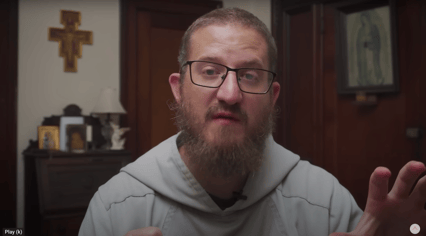Have you ever felt stuck in your walk with Jesus?
At some point in your journey with God, you make the big decision and ask Jesus to be the centre of your life. It feels wonderful for a while. The world as you knew it before seems like a cheap, black and white version of the reality you now see in God.
We all stay in this place for different lengths of time. For some of us, this spiritual honeymoon lasts years and for others, it may only be a few days. At some point you may start to feel like you’re not making any progress in your life with God.
In John 10:10, Jesus said, “I came that they may have life, and have it abundantly.” You might deeply desire the “abundant life” Jesus offers, you just don’t know how to get there.
So what is this abundant life?
It’s not the prosperity Gospel (believe in Jesus and you will be rich) or the more common self help Gospel (believe in Jesus and everything will go well for you). It’s also not the opposite, the Gospel of white-knuckling (following Jesus is constantly difficult and just requires grit).
In Jesus’ view of the good life, we eventually come to a place where we see all things through the lens of intimacy with Jesus.
No matter your circumstances you can be changed to find the love of God in all things. The abundant life brings you to a state where everything you do is pervaded by love.
This life Jesus offers is about deep transformation on a soul level.
Myths About Following Jesus
This abundant life sounds wonderful. The problem with it is that the initial energy and romanticism that occur in the first stages of following Jesus become insufficient as we come face to face with our lived reality.
Out of this place, two myths about following Jesus can start to creep into our lives.
The first myth is that personal relationship with Jesus is the answer to the abundant life. If you’re not experiencing it, you just need to deepen your relationship. The issue with this theory is that it’s mostly true. Personal relationship with Jesus is essential and non-negotiable. How can you follow someone you do not know?
In Luke chapter 4, Jesus visits His hometown of Nazareth. He preaches and reveals that the Scriptures have been fulfilled. Immediately the people of Nazareth, who have known Jesus for almost 30 years, were filled with rage and tried to hurl Him from a cliff. They had personal relationship with Jesus but they did not follow Him.
If we look at this story through the lenses of our everyday relationships, we can find similar parallels. It’s absolutely possible to be in a romantic relationship with another person but to not live out the practices that make a relationship healthy.
The other theory proposes that we just need to know the Truth and live from it. This theory posits that with enough Scripture reading and study of the Catechism we will access the abundant life.
This theory is problematic for similar reasons to the first one. It’s mostly true. We do have to study and know what the Church teaches and then live from that place of truth. It’s just not complete.
If this idea was completely true then overcoming life issues like anxiety would simply require reading Jesus’ teaching about worry in the Sermon on the Mount and all our anxieties would disappear.
These myths may sound ridiculous when they’re stated so outrightly but with deeper examination, we find that they creep into our lives subtly, touching many aspects of our walk with God.
The Criticalness of Practice
The abundant life comes about by practicing the lifestyle of Jesus, adopting and adapting His habits to be our own.
Over time we can be transformed into His image. Only when we start to become like Jesus can we experience His life.
One of the dangers of thinking this way is that it easily becomes a religious checklist or another version of the prosperity Gospel (if I do these things then I will be happy and experience the abundant life).
To guard against this idea, we have to remember that God does the work of transformation, not us.
Our effort is to make space in our lives for God to touch and transform us. As the American theologian Dallas Willard says “grace is not opposed to effort, it's opposed to earning.”
What is a Rule of Life?
The framework that we use to help us enter into the habits or practices of Jesus is an ancient idea, popularized in the 6th century by St. Benedict who is considered the father of Western monasticism. This concept is called a Rule of Life.
A Rule of Life is "a schedule and set of practices and relational rhythms that help us create space [for God and community] in our busy world" (Practicing the Way).
This Rule of Life is not another religious checklist.
It’s meant to help guard you against the habits and ideas that can form you in a way counter to things that are not actually life-giving and to give you structure so that you can grow and bear much fruit in your life with God.
Hopefully, practiced with patient endurance over time, this Rule of Life will allow you to create space for God to transform you into the kind of person who has the capacity to experience abundant life.
It does not include everything necessary for growth in the spiritual life (like the Sacraments) but it does give you a point from which to grow beyond the early stages of discipleship.
Right now, I work for the Archdiocese of Halifax-Yarmouth coordinating their chaplaincy community. In our community, we’ve created this Rule of Life with university-aged students in mind, but you could just as easily use it as a starting place to begin building your own.

Our Rule of Life
Our Rule of Life is very simple and is based on 4 core practices.
Examen
5 to 10 minutes nightly to review your day with God, noting consolation, desolation, and making resolutions to grow tomorrow.
Sabbath
A weekly 4 to 24-hour, tech-free period (usually on Sundays) to stop working, rest, and do what brings you delight in God.
Prayer
10 to 20 minutes daily (usually in the morning) to meditate on Scripture and contemplate God, especially through beauty.
Mission
Intentionally and creatively serving as a community to give witness to God's work in your lives, proclaim the Gospel, and form others.

Anyone can create their own simple Rule of Life. If you feel compelled to get started, set aside some time for prayer and note down the practices that strike your heart. Start with practices you aren't doing that you feel could make a difference in your walk with God and then work on adding the others as you grow.
You can use ours as a starting point, and look through a few more for further consideration:
Hospitality
Fasting
The Rosary and other devotions
The Monastic Hour (an hour a day free from technology)
Praise and worship
Simplicity of possessions and lifestyle
Small group
Scripture reading
These are only here to get your imagination going, there are countless others in the story of Jesus’ life and in the lives of the saints. As you build out your Rule of Life, try to keep a balance of practices done in community and practices done personally, as well as practices that would be easy for you right now and some that will take some stretching.
I truly believe that practices from the lifestyle of Jesus, lived out in the context of community, will lead to deep transformation for all of us and will guide us into the abundant life He promises.
Much of this content has been adapted for Holy Cross Chaplaincy from John Mark Comer and Practicing the Way. To find out more, visit www.practicingtheway.org.
This article was originally published as a resource for Holy Cross Chaplaincy: https://hcchaplaincy.ca/resources/hccs-rule-of-life





